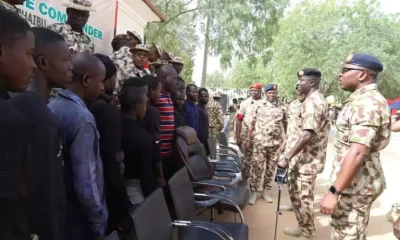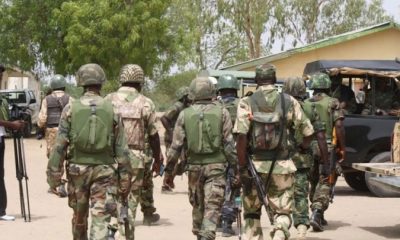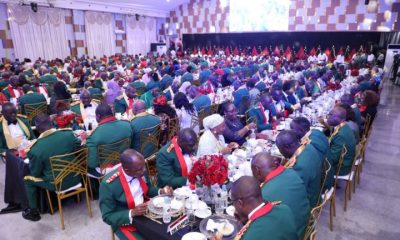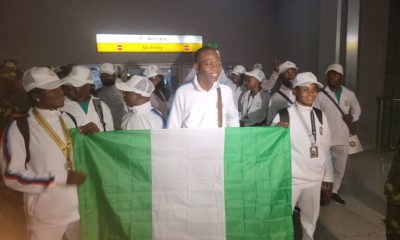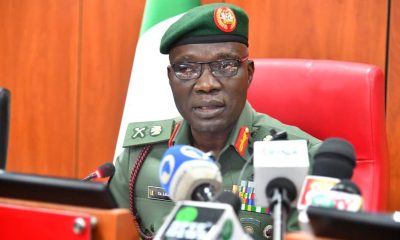Headline
Army Discovers Bombs In Ikeja 21 Years After Blast, Begins Clearance
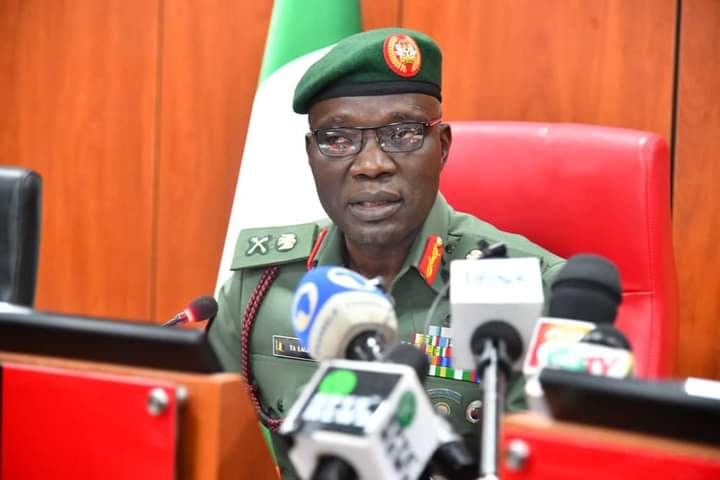
The army authorities have discovered explosives at the scene of the Ikeja bomb blast, 21 years and nine months after.
The explosion which occurred on January 27, 2002 at the Military Cantonment in Ikeja is believed to have killed at least 1,100 people and displaced over 20,000 with many others injured and rendered homeless.
Bombs and other explosives mistakenly went off in the armoury section of the barracks.
The explosion, which sounded about seven times, over two days, led to the destruction of properties in and around the area. It was an unprecedented occurrence, so people scampered for safety.
Speaking in Lagos Tuesday at the flag off of the “Exercise Clean Sweep”, the Chief of the Army Staff (COAS), Lieutenant-General Tajudeen Lagbaja, said the army had finally commenced the movement of the remaining unexploded ordinance to one of its bases in Ajilete, Ogun State.
He said the initial clearance operation done in 2002 ensured some degree of safety in the Ikeja Cantonment and environs.
The COAS said the recent discovery of some unexploded explosive ordnances at the site of the 2002 blast raised the need for the army to carry out a follow up clearance exercise.
He said the 60+1 day exercise would be held from October 10 to December 10 and that it would involve the mobilisation of engineers’ plants and other necessary equipment to the site.
“There will also be movements and disposal of recovered unexploded explosive ordnances from Ikeja Cantonment to the Nigerian Army Range at Ajilete in Ogun State during this exercise.
“The objective of Exercise Clean Sweep is to totally disinfect the epicenter of the Ikeja bomb blast and clear it of all verified and suspected remaining Unexploded Explosive Ordnance. This will aid putting the site to future safe and productive use by the Nigerian Army and the larger Ikeja community.
“I must state at this point that exercises of this nature are time and resource consuming. It has taken this long to finalize the clearance operation, not because of lack of will but because it requires long term planning and acquisition of relevant expertise and equipment.
“I am happy today, to report that the Nigerian Army, with the support of the government and our international partners, has got what it takes to embark on such an ambitious and arduous cleanup. This briefing is a sensitization campaign to adequately notify the people of Lagos and Ogun states of the cleanup exercise. It also serves as an avenue to seek the support and collaboration of the Governments and the good people of Lagos and Ogun States for safe and smooth conduct of Exercise Clean Sweep,” Lagbaja said.
He added, “I wish to assure the general populace, especially Lagos and Ogun states residents, that the exercise will be conducted in the most professional manner with all necessary safety and security measures emplaced in line with global best practices.”
“To further reassure the citizenry, I have directed that adequate sensitization and awareness on the impending exercise be carried out on popular electronic, print, and social media. I implore the people of Lagos and Ogun states to not panic on sighting the movement of heavy vehicles and equipment as well as the sound of demolition of recovered Unexploded Explosive Ordnance at the Nigerian Army Range Ajilete, in Ogun State.
“The Nigerian Army equally seeks the cooperation of relevant government agencies and parastatals in Lagos and Ogun states, such as the State Emergency Management Agencies, the Federal Fire Service, Federal Road Safety Corp, Nigerian Police and the Department of State Services towards ensuring the success of this clean up exercise,” he added.
The COAS said it had taken the army 21 years and nine months to arrive at this point, adding that the journey might have been perceived as slow, but had been steady and painstaking.
“The best compensation we can give to the victims of the 2002 bomb blast is to make the site and others secure for those living to avoid reoccurrence,” he added.
But in an interview with one of our correspondents last night, a retired Nigerian Air Force personnel, John Ojikutu, said the discovered unexplosive materials couldn’t have been there for that very long time.
Ojikutu, who retired as Group Captain in the force, explained that it might have been planted in recent times, saying no incident had happened in Lagos that warranted such materials to be there.
“I’m an indigene of Lagos. Though, I hail from Isale Eko and I have not heard of this type of incident before. Even during the Civil War, there I don’t think such device was planted anywhere in the Centre of Excellence,” he said.
Headline
EFCC bars dollar transactions, orders embassies to charge in naira

The Economic and Financial Crimes Commission has barred foreign missions based in Nigeria from transacting in foreign currencies and mandated them to use Naira in their financial businesses.
The EFCC has also mandated Nigerian foreign missions domiciled abroad to accept Naira in their financial businesses.
The anti-graft agency said the move is to tackle the dollarisation of the Nigerian economy and the degradation of the naira
The Commission, therefore, asked the government to stop foreign missions in Nigeria from charging visa and other consular services in foreign denominations.
The EFCC gave the advisory in a letter to the Minister of Foreign Affairs, Amb. Yusuf Tuggar, for onward transmission to all foreign missions in the country.
In the letter, the EFCC said it issued the advisory because the practice of paying for consular services in dollars was in conflict with extant laws and financial regulations in Nigeria.
In a letter dated April 5, 2024, which was addressed to the Minister of Foreign Affairs, Ambassador Yusuf Tuggar, titled: “EFCC Advisory to Foreign Missions against Invoicing in US Dollar,” the EFCC Chairman, Ola Olukoyede expressed dismay over the invoicing of consular services in Nigeria by foreign missions in dollars.
The EFCC cited Section 20(1) of the Central Bank of Nigeria Act, 2007, which makes currencies issued by the apex bank the only legal tender in Nigeria.
The letter read, “I present to you the compliments of the Economic and Financial Crimes Commission, and wish to notify you about the commission’s observation, with dismay, regarding the unhealthy practice by some foreign missions to invoice consular services to Nigerians and other foreign nationals in the country in United States dollar ($).
“It states that ‘the currency notes issued by the Bank shall be the legal tender in Nigeria on their face value for the payment of any amount’.
“This presupposes that any transaction in currencies other than the naira anywhere in Nigeria contravenes the law and is, therefore, illegal.”
The commission further stated that the rejection of the naira for consular services in Nigeria by certain missions, along with non-compliance with foreign exchange regulations in determining service costs, is not just unlawful but also undermines the nation’s sovereignty embodied in its official currency.
The letter continues: “This trend can no longer be tolerated, especially in a volatile economic environment where the country’s macroeconomic policies are constantly under attack by all manner of state and non-state actors.
“In light of the above, you may wish to convey the commission’s displeasure to all missions in Nigeria and restate Nigeria’s desire for their operations not to conflict with extant laws and regulations in the country.”
Diplomatic sources said yesterday, May 10, that some embassies were wondering whether the EFCC’s advisory represented the position of the Federal Government.
Headline
Prince Harry visits sick Nigerian soldiers in Kaduna

Prince Harry and his team visited the 44 Nigerian Army Reference Hospital in Kaduna to interact with wounded soldiers who are receiving treatment.
The Duke of Sussex is in Nigeria with his wife to champion the Invictus Games, which Harry founded to aid the rehabilitation of wounded and sick servicemembers and veterans.
Nigeria joined the Invictus Community of Nations in 2022 becoming the first African country to join.
Prince Harry’s visit to Kaduna came 68 years after his late grandmother Queen Elizabeth II visited the state during the time of the late Premier of Northern Region Sir Ahmadu Bello.




-

 Headline2 days ago
Headline2 days agoSuspend cybersecurity levy– Reps to CBN
-

 Headline2 days ago
Headline2 days agoTinubu resumes work after foreign trip
-

 Business2 days ago
Business2 days agoNigeria needs over $2bn to revive Ajaokuta Steel Plant, says Minister
-

 News2 days ago
News2 days agoShan George’s money returned to Zenith Bank account
-

 Entertainment3 hours ago
Entertainment3 hours agoAMVCA Cultural Day: BBNaija’s Neo, Venita win Best Dressed Male, Female
-

 Metro3 hours ago
Metro3 hours agoEx-Sports Minister laments after hospital neglected him for hours over N80000 deposit
-

 Headline3 hours ago
Headline3 hours agoPrince Harry visits sick Nigerian soldiers in Kaduna

